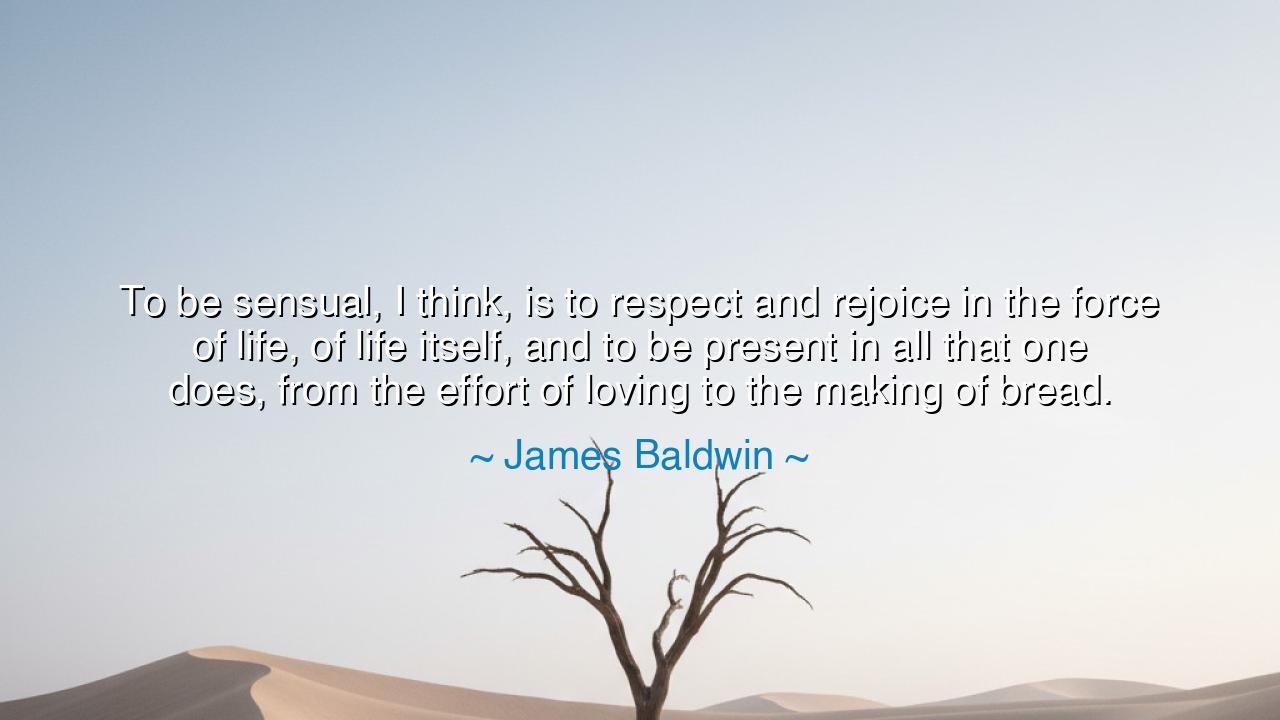
To be sensual, I think, is to respect and rejoice in the force of
To be sensual, I think, is to respect and rejoice in the force of life, of life itself, and to be present in all that one does, from the effort of loving to the making of bread.






James Baldwin, the prophet of Harlem, the seer of the human soul, once declared: “To be sensual, I think, is to respect and rejoice in the force of life, of life itself, and to be present in all that one does, from the effort of loving to the making of bread.” These words shimmer with a wisdom that transcends mere indulgence. For Baldwin does not speak of sensuality as shallow pleasure or fleeting desire; he speaks of it as a profound reverence for life itself, a recognition of the sacred pulse that flows through every act, from the loftiest love to the humblest labor.
The origin of this truth lies in Baldwin’s lifelong struggle to reconcile the beauty of existence with the agony of injustice. He had seen too many people, especially those oppressed by race, poverty, or rejection, become estranged from their own bodies, from their own capacity to rejoice in life. To be sensual, for Baldwin, was an act of defiance, a declaration that one would not be reduced to survival alone, but would embrace life’s fullness. In loving, in creating, even in baking bread, the individual claims dignity, presence, and joy.
The ancients knew this as well. In Greece, the philosophers taught that the good life was one of harmony, where body, mind, and spirit were all honored. In the East, the mystics of India spoke of mindfulness, of being wholly present even in the simplest acts—whether eating, breathing, or walking. The Hebrew psalmist sang, “Taste and see that the Lord is good,” proclaiming that even the senses were avenues to the divine. Baldwin’s voice joins this eternal chorus: to respect life is to taste it, to touch it, to live it fully.
History gives us luminous examples. Consider Mahatma Gandhi. Though he led movements that shook empires, he never divorced himself from the humble, tactile rhythms of life. He spun his own thread, baked his own bread, and lived simply, teaching that dignity is found not only in great speeches but in the reverent attention to daily acts. In Gandhi’s hands, the act of making bread became a prayer of presence—precisely what Baldwin exalts: the celebration of life in its simplest forms.
The lesson is clear: to live without presence is to live half-dead. Many rush through their days, consumed by ambition, resentment, or distraction, forgetting to notice the warmth of a touch, the fragrance of a meal, the joy of creating. Baldwin warns us that to forget sensuality—not lust, but the reverence of life’s force—is to betray our humanity. For life is not only endured; it is to be respected and rejoiced in.
Practical actions follow. When you love, love with your whole being—be present, undivided. When you work, whether building houses or baking bread, do it with awareness, feeling the life that flows through your hands. Pause each day to notice what you see, hear, taste, and touch, and let these remind you that you are alive. Do not flee from your senses, but honor them as messengers of life. In this way, every act becomes a celebration, every breath a hymn of gratitude.
Thus, O listeners, let Baldwin’s words echo within you: “To be sensual is to respect and rejoice in the force of life.” In them lies a call not to escape life, nor to scorn it, but to embrace it wholly—through body, mind, and spirit. To live thus is to turn the ordinary into the extraordinary, the daily into the divine.
And remember this eternal truth: the measure of life is not found in survival alone, but in presence. Rejoice in life, respect it, and be present in all things—from the passion of love to the making of bread—and you will live not as a shadow, but as a flame.






AAdministratorAdministrator
Welcome, honored guests. Please leave a comment, we will respond soon